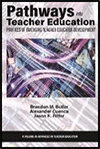
Pathways Into Teacher Education
Profiles of Emerging Teacher Educator Development
Edited by:
Brandon M. Butler, Old Dominion University
Alexander Cuenca, Indiana University
Jason K. Ritter, Duquesne University
A volume in the series: Advances in Teacher Education. Editor(s): Diane Yendol-Hoppey, University of North Florida. David T. Hoppey, University of North Florida. Jennifer L. Snow, Boise State University. Jennifer Jacobs, University of South Florida.
Published 2023
Teacher educator learning has received increasing attention in recent decades. Although the professional development needs of teacher educators has become more visible, the spaces where teacher educators learn to teach teachers is less clear. How do teacher educators learn? What do they learn? And where does this learning take place? This edited volume provides answers these questions through an unpacking of the programs, courses, and professional learning spaces in which beginning teacher educators learn.
In this edited volume, chapters provide profiles, or “cases,” of the spaces in which beginning university-based teacher educators are prepared. University based teacher educator learning occurs in a range of settings. As highlighted in this volume, such learning spaces include doctoral program concentrations or minors focused on the development of teacher educator identity and practice; individual doctoral courses dedicated to teacher education; formalized program experiences that assist in the preparation of teacher educators; and mentoring or critical friendship collaborations through which doctoral students learn about teacher education with peers or from experienced teacher educators.
CONTENTS
Framing Emerging Teacher Educator Learning: An Introduction, Alexander Cuenca, Jason K. Ritter, and Brandon M. Butler. PART I: SEQUENCED OPPORTUNITIES FOR EMERGING TEACHER EDUCATOR LEARNING. Becoming Effective Teacher Educators Through Sustained Mentoring and Scaffolded Teaching Internships, Tracy Rock, Tina Hafner, Drew Polly, Julie Bacak, Kaitlyn Holhouser, and Leslie Schmidt. Considering the World of the Teacher Educator: The Shaping of Critical Teacher Educators Through Informed Enactment and Reflection, Stephanie L. Dodman, Leslie La Croix, Mark E. Helmsing, Rebecca K. Fox, Rebecca Brusseau, Sara Kirschner. Individual Journeys Bound by Shared Commitments to Humanizing Research and Pedagogy: Doctoral Education at Michigan State University, Anne-Lise Halvorsen, Sandra Crespo, Brittany L. Jones, Sheila Orr. Addressing the Problem of Teacher Educator Development: Teacher Education as a Doctoral Minor Course of Study, Robert Kunzman and Alexander Cuenca. PART II: FORMAL OPPORTUNITIES FOR EMERGING TEACHER EDUCATOR LEARNING. The Strategic Use of Questioning in Doctoral Seminars on Teacher Education, Aaron Zimmerman, Corinne Barger, Taylor Darwin, Jesus Esquibel, Elizabeth R. Goldberg, Stacey Sneed, Shannon Watson. The Pedagogy of Teacher Education Course: Learning and Living Teacher Education Practice and Self-Study Research Methods, Brandon M. Butler. Mentoring and Empowering Doctoral Students Through Collaborative Co-Teaching: Lessons From a Joint Special Education Doctoral Program, Ya-Chih Chang, Anna Osipova, and Lois Weinberg. PART III: MEDIATED OPPORTUNITIES FOR EMERGING TEACHER EDUCATOR LEARNING. The Power of Collaboration: Advancing Teacher Education Through an Equity Learning Community, Jennifer K. McCorvey, Samantha Haraf, Jennifer I. Perez, Stephanie Arthur, Amber MacDonald, Randi Latzke, Jennifer Jacobs, Raven Robinson, and Nicholas Catania. Opening Space: Collaboratively Developing a Supervisor Community of Practice, Mary R. Klehr, Kelly D. Hayek, Thomas C. Owenby, and Laura M. Lang. Windows, Mirrors, and Sliding Glass Doors: Co-Teaching and Co-Supervision Internship Models for Teacher Educator Learning, Jenny Goransson, Kristien Zenkov, and Marion Taousakis. Achieving Teacher Education Praxis Through a Multi-Faceted Internship Experience: Embedding Learning in Action, Mark M. Diacopoulos and Brandon M. Butler. Developing Future Music Teacher Educators Through Authentic Context Learning and Near-Peer Mentorship, Erik Johnson. Preparing International Teaching Assistants to Work as Teacher Educators in the United States Context, Lou Tolosa-Casadont. Developing K–12 Master Teachers as University-Based Teacher Educators, Cynthia Callard, Stephanie Martin, Michael Occhino, Peter Kalenda, Orlando Marrero, Denise Schultz, Sean Coffey, and LaShara Evans. UTeach Nation: How Teacher Educators Create Communities of Practice and Professional Development Within the UTeach Network, Elizabeth R. Goldberg, Pamela Kirkland, and Mary L. Urquhart. PART IV: INDIVIDUAL PERSPECTIVES ON EMERGING TEACHER EDUCATOR LEARNING. Learning Beyond the Scripts: Professional Development Through a Racialized Perspective, Nathanie Lee. “But You Taught Me to Stand Up for Myself, and Now I Need to Stand Up for My Country, for My People!” Navigating Learning Spaces and Forging Critical Friendship as Teacher Educators, Oksana Moroz and Gloria Park. Supporting an Emerging Identity Through a Virtual Third Space: The Informal Mentorship Between a Novice Teacher Educator and Experienced Mentor, Amber Adgerson and Kristin E. Harbour. (Re)Centering Well-Being: Holding Space for Creatives and Educators, Rosalynne E. Duff and Laura E. Meyers. Doctoral Support Spaces: A Narrative About a Black Woman’s Learning Journey, Celicia LaShay Bell. Biographies.
-
Paperback979-8-88730-453-3
Web price: $45.04 (Reg. 52.99)
-
Hardcover979-8-88730-454-0
Web price: $80.74 (Reg. 94.99)
- eBook979-8-88730-455-7

- EDU053000 - EDUCATION: Training & Certification
- EDU046000 - EDUCATION: Professional Development
- EDU002000 - EDUCATION: Adult & Continuing Education
-
 (Re)Designing Programs:
A Vision for Equity-Centered, Clinically Based Teacher Preparation
(Re)Designing Programs:
A Vision for Equity-Centered, Clinically Based Teacher Preparation
-
 Collaboration, Narrative, and Inquiry That Honor the Complexity of Teacher Education
Collaboration, Narrative, and Inquiry That Honor the Complexity of Teacher Education
-
 Cultivating Democratic Literacy Through the Arts
Guiding Preservice Teachers Towards Innovative Learning Spaces in ELA Classrooms
Cultivating Democratic Literacy Through the Arts
Guiding Preservice Teachers Towards Innovative Learning Spaces in ELA Classrooms
-
 Exemplary Clinical Models of Teacher Education
Exemplary Clinical Models of Teacher Education
-
 Outcomes of High-Quality Clinical Practice in Teacher Education
Outcomes of High-Quality Clinical Practice in Teacher Education
-
 Preparing the Next Generation of Teacher Educators for Clinical Practice
Preparing the Next Generation of Teacher Educators for Clinical Practice
-
 Professional Learning Journeys of Teacher Educators
Professional Learning Journeys of Teacher Educators

